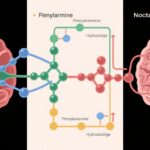Highlight
– The European Medicines Agency (EMA) has issued a positive opinion recommending the marketing authorization of sebetralstat (Ekterly), the first oral on-demand treatment for acute hereditary angioedema (HAE) attacks in patients aged 12 and older.
– Sebetralstat demonstrated significantly faster symptom relief, reduced attack severity, and improved attack resolution compared to placebo in the KONFIDENT phase 3 trial (N Engl J Med, 2024).
– The drug’s oral administration offers a practical advantage over currently available injectable options, with a safety profile comparable to placebo.
Background
Hereditary angioedema (HAE) is a rare, autosomal dominant disorder characterized by recurrent episodes of severe, localized, and often unpredictable swelling in the skin, gastrointestinal tract, and upper airway. The underlying pathology is most commonly due to a deficiency or dysfunction of C1 esterase inhibitor (C1-INH), resulting in unchecked activation of the kallikrein-kinin system and excessive generation of bradykinin, a potent vasoactive peptide responsible for increased vascular permeability and tissue edema.
The clinical burden of HAE is considerable. Attacks can be life-threatening—particularly those involving the upper airway—and are frequently associated with pain, disfigurement, and significant reductions in quality of life. Historically, acute attacks have required parenteral therapies, including C1-INH concentrates, bradykinin receptor antagonists (e.g., icatibant), and plasma kallikrein inhibitors (e.g., ecallantide, approved in some regions). These therapies, while effective, are limited by the need for intravenous or subcutaneous administration, often resulting in treatment delays and additional patient burden.
Despite advances, there has been a significant unmet need for effective, safe, and user-friendly oral therapies for on-demand management of HAE attacks.
Study Overview and Methodological Design
The KONFIDENT phase 3 trial provides the pivotal data underpinning the EMA’s recommendation for sebetralstat. This was a randomized, double-blind, placebo-controlled, crossover study conducted in 136 patients with diagnosed HAE (age ≥12 years; types I or II). Eligible participants were required to have a history of HAE attacks and access to standard-of-care rescue therapy.
Participants were randomized to receive either sebetralstat (300 mg, oral tablet) or placebo at the onset of an eligible HAE attack, with treatment arms crossed over for subsequent attacks. The primary endpoint was the time to beginning of symptom relief, as measured by a validated visual analog scale (VAS) for attack symptoms. Secondary endpoints included time to meaningful symptom relief, attack severity, complete resolution of the attack, and safety/tolerability outcomes.
The trial was appropriately powered to detect clinically meaningful differences and employed rigorous blinding and crossover design to minimize confounding and intra-subject variability.
Key Findings
The KONFIDENT trial demonstrated that sebetralstat achieved:
– A statistically significant reduction in the median time to onset of symptom relief compared to placebo (1.61 hours vs. 9.02 hours; hazard ratio 2.68; 95% CI, 1.82 to 3.95; P<0.001).
– Faster time to meaningful symptom relief and attack resolution. The proportion of patients achieving symptom relief at 4 hours was higher in the sebetralstat group than placebo.
– Reduction in attack severity and need for rescue medication.
– A safety profile similar to placebo, with headache being the most common adverse effect.
Notably, the findings were consistent across age groups (adolescents and adults), attack locations, and HAE types (I and II).
Mechanistic Insights and Pathophysiological Context
Sebetralstat is a selective, oral plasma kallikrein inhibitor. By directly targeting plasma kallikrein, sebetralstat interrupts the cascade leading to excessive bradykinin formation, thereby preventing the key mediator of vascular permeability and swelling in HAE. This mechanism is biologically rational and supported by robust preclinical and early-phase clinical data.
The oral formulation enables administration at the earliest symptom onset, potentially before maximal bradykinin accumulation and tissue edema, which could explain the rapid symptom resolution observed in the trial.
Clinical Implications
The approval of sebetralstat as the first oral on-demand therapy for HAE represents a paradigm shift in acute attack management. Key clinical implications include:
– Greater accessibility and convenience for patients, likely improving adherence and reducing treatment delays.
– Potential to reduce emergency department utilization and complications from delayed therapy.
– Broader options for adolescents (≥12 years) and adults, with no requirement for injectable administration or specialized storage/training.
– The safety profile supports outpatient, self-administered use.
A hypothetical case vignette: Sarah, a 24-year-old woman with type I HAE, experiences frequent abdominal attacks. Previously, delays in self-injecting icatibant often resulted in prolonged pain and missed workdays. With sebetralstat, Sarah administers an oral tablet as soon as symptoms begin, leading to faster relief and improved quality of life.
Limitations and Controversies
– The trial population, while robust, may not fully represent patients with more severe disease phenotypes or those with comorbid conditions.
– The long-term safety of repeated sebetralstat administration, as might occur in patients with frequent attacks, remains to be established.
– Head-to-head comparisons with existing injectable therapies are currently lacking.
– Cost and access, particularly after orphan drug incentives are reviewed, remain to be clarified.
– The EMA’s ongoing review of the orphan designation may have future implications for reimbursement and availability.
Expert Commentary or Guideline Positioning
Current international HAE management guidelines (e.g., WAO/EAACI 2022) recommend rapid on-demand therapy at the onset of attacks, with a strong emphasis on patient autonomy and timely self-administration. Expert opinion leaders have hailed sebetralstat as a long-awaited oral option that could address key barriers to acute management, while underscoring the importance of continued access to established therapies for breakthrough or severe attacks.
Conclusion
The EMA’s positive opinion for sebetralstat marks a significant advance in the management of hereditary angioedema. As the first oral on-demand therapy, sebetralstat offers a promising, convenient, and effective alternative to injectable medications, addressing a major unmet need in this rare and potentially life-threatening disorder. Ongoing surveillance and real-world data will be crucial to establish its long-term safety, comparative effectiveness, and place in therapy.
References
1. Riedl MA, Farkas H, Aygören-Pürsün E, et al; KONFIDENT Investigators. Oral Sebetralstat for On-Demand Treatment of Hereditary Angioedema Attacks. N Engl J Med. 2024 Jul 4;391(1):32-43. doi: 10.1056/NEJMoa2314192.
2. Maurer M, Magerl M, Ansotegui I, et al. The international WAO/EAACI guideline for the management of hereditary angioedema – The 2022 revision and update. Allergy. 2022;77(7):1961-1990.
3. Longhurst HJ, Cicardi M. Hereditary angioedema: Epidemiology, pathophysiology, and management. Front Med (Lausanne). 2022;9:882633.



